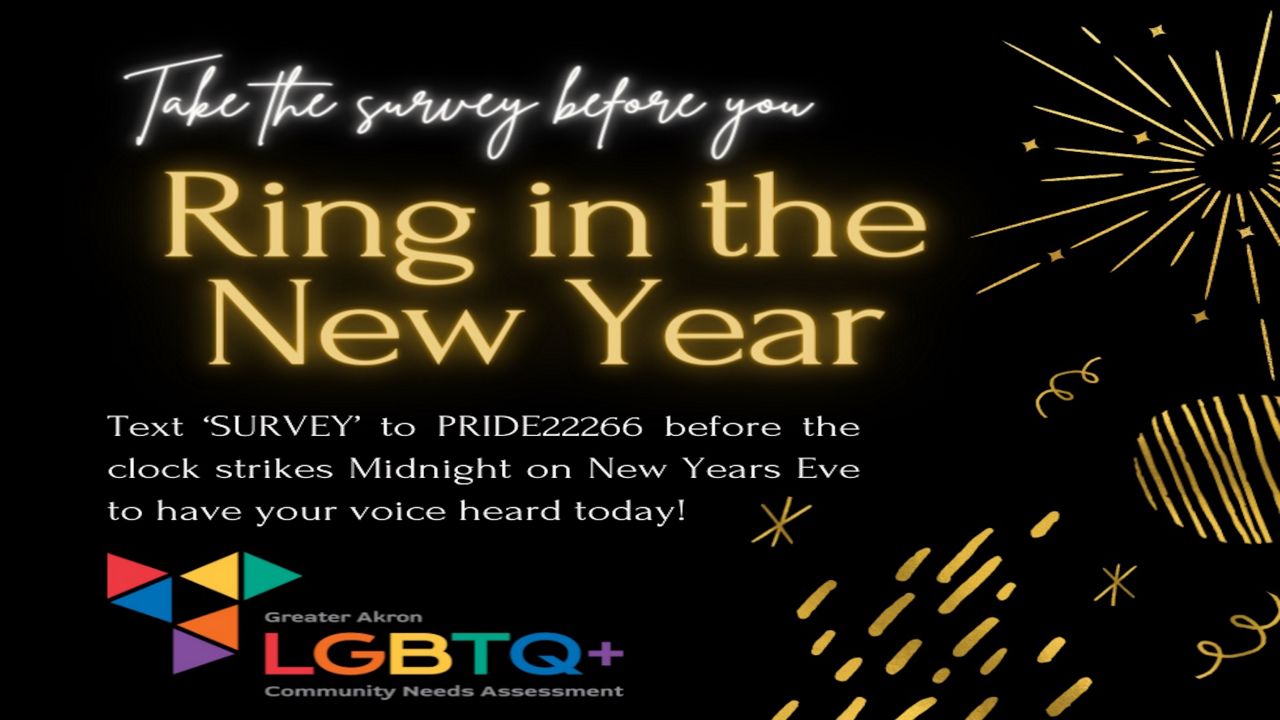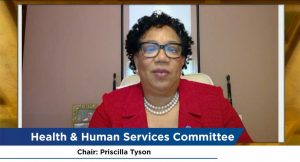AKRON, Ohio — The pandemic forced the cancellation of the Akron Pride Festival’s Rainbow Ball, but festival organizers are asking for the community’s help before midnight on New Year’s Eve.
They’re asking Greater Akron residents to participate in a comprehensive LGBTQ+ needs assessment survey before midnight on Dec. 31 by texting “SURVEY” to PRIDE22266.
Spearheaded by Andrew Snyder, research program coordinator with Kent State University‘s College of Public Health, the needs assessment is considered the first of its kind in this region.
The survey launched in June during the Akron Pride Festival, with the goal of reaching 1,000 participants, Snyder said.
With two days left, the survey has generated 972 responses.
“It’s coming down to the 11th hour, but I think that means we were anticipating the right number,” Snyder said. “I really think we might hit our goal.”

Fewer than 30 participants are still needed before midnight on New Year’s Eve. (Courtesy of Akron Pride Festival)
The 30-minute survey is designed to shine a light on the resources available to the LGBTQ+ community, identifying strengths, weaknesses, service gaps and variables that impact this population, Snyder said.
Participants can discontinue participation in the survey at any time in the process, he said.
The information gathered is intended to help inform the work of potentially hundreds of agencies — from health care organizations to social services groups — that serve this growing population.
The data that’s gathered will identify any gaps or weaknesses in local resources, Snyder said, while focus groups held throughout 2022 are expected to further clarify how the LGBTQ+ community is affected.
“It’s not really a surprise that mental health issues and concerns are ranked pretty high on the survey,” Snyder said. “So people can come in and paint the picture a little bit more of what it looks like to be queer in Akron dealing with mental health issues. So at the end, the final product isn’t just saying, ‘Hey, mental health is a problem for our community,’ it’s saying ‘mental health is a problem for our community and this is why.’ It’s a really an important piece.”
Those who participate in the focus groups, which will be anonymous, will receive a $10 gift card, Snyder said.

Andrew Snyder, research program coordinator with Kent State University ‘s College of Public Health, spearheaded the needs assessment. (Courtesy of Andrew Snyder)
“They’re going to be opening up and sharing some really painful experiences,” he said. “I know I’ve had some negative health care provider experiences, and it’s not something that you want to open up to the whole world and we’re trying to recognize that.”
Eligibility for the survey extends to anyone in the LGBTQ+ community who lives in Summit, Portage, Stark and Medina counties, or has a connection to Akron.
It is also open to anyone in the LGBTQ+ community who relies on health care, social services or recreational facilities in the region, or who works or goes to school here, he said.
“As LGBTQ+ individuals and as a community, we have an abundance of strength, resilience and resourcefulness,” researchers posted online in a message to the community. “At the same time, our community continues to be disproportionately affected by a range of physical, mental and behavioral health, economic, social, legal and political issues, and our needs can be overlooked by mainstream organizations.”
Nearly 100 local agencies have partnered with the researchers, Snyder said, showing a strong level of support that’s unusual for a new effort that’s setting precedence.
“It just really continues to be a delight and a surprise, and my personal privilege, to work with all these groups and see them come together to bring the data together,” Snyder said.
The data the survey is capturing will be invaluable for a host of organizations, he said.
Several of them are health care agencies, which can use the data to help shape services for LGBTQ+ health, which is a newer field, Snyder said, referencing Akron Children’s Hospital’s Center for Gender Affirming Medicine and Summa Health System’s Pride Clinic.
Funding for the survey initially came from corporate, philanthropic and government entities, but Snyder opened it up to crowdsourcing so individuals can donate smaller amounts and potentially feel a greater connection to the work, he said.
“I still feel really strongly that people might want to put their name on this, and maybe put in a dedication to somebody that they’ve lost, or has had a really traumatic experience,” Snyder said.
For more information about the LGBTQ+ needs assessment, visit the research website.




